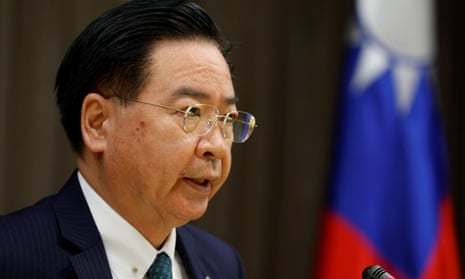Taiwan’s foreign minister has said he is preparing for the possibility of a conflict with China in 2027.
Speaking on LBC’s Tonight with Andrew Marr, Joseph Wu said: “We are taking the Chinese military threat very seriously … I think 2027 is the year that we need to be serious about.”
US intelligence believes that Xi Jinping, China’s leader, has ordered the country’s military to be ready by 2027 to annex Taiwan. China regards Taiwan, a democratic and self-governing island, as a renegade province that must be reunited with the mainland. Since he came to power in 2012, Xi has stressed that the Taiwan issue “cannot be passed on from generation to generation”.
On Friday, China’s foreign minister, Qin Gang, said both sides of the Taiwan strait belonged to China, and that “those who play with fire on Taiwan will eventually get themselves burned”.
Some US officials believe a conflict may come sooner. In January, Gen Mike Minihan, a former deputy commander for US Indo-Pacific command, said his “gut” told him to expect a conflict in 2025.
On Tuesday, Adm John Aquilino, the head of US Indo-Pacific command, told the armed services committee in Congress that “everybody is guessing” when it comes to predicting timelines for a conflict.
Yun Sun, the director of the China programme at the Stimson Center, a US thinktank, said: “Military capabilities are the necessary but not sufficient condition for China to launch an attack. Military readiness does not suggest that China will take the move.”
Sun noted that Chinese authorities had never publicly set a 2027 target. She said: “I don’t think Xi is planning to invade Taiwan in 2027, unless Taiwan declared independence by that time.”
Nonetheless, Wu’s comments on Thursday indicate the extent to which Taiwan is trying to bolster support from the west ahead of a possible invasion. In the interview with Marr, Wu emphasised the risks to the UK posed by a conflict, saying that “even though the UK is looking at China as an economic opportunity in the long run”, an attack on Taiwan would affect the UK “in a very serious manner”.
“Therefore we need to look at a comprehensive way in for the UK, Taiwan and other countries to come together”.
In particular, Wu stressed the extent to which the UK – and the rest of the world – is dependent on the semiconductors produced in Taiwan, which makes more than 90% of the most advanced computer chips. “If there’s any disruption to the supply chain or to the shipping lanes, I think it’s going to have a serious impact upon the rest of the world,” Wu said.
In an interview with the Guardian on Tuesday, the UK’s foreign minister, James Cleverly, said the UK must not “just pull the shutters down” on its relationship with China. But lawmakers on both sides of the Atlantic are becoming increasingly concerned about the threat China poses to regional and global security.
Wu drew an analogy between China and Russia, saying the world had failed to take Russia’s aggressive postures seriously in the past. He said: “We did not stop Russia from taking over Crimea. And the Russians were emboldened to go ahead and initiate a war against Ukraine.
“We did not stop China from imposing national security law in Hong Kong. And people were asking: is Taiwan going to be next? Now Taiwan is feeling all this pressure.”
